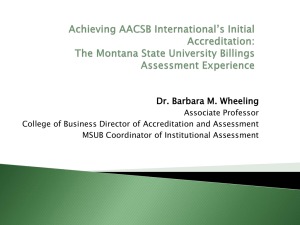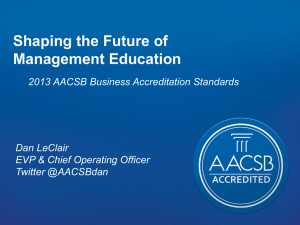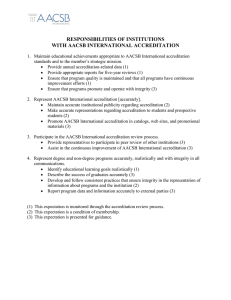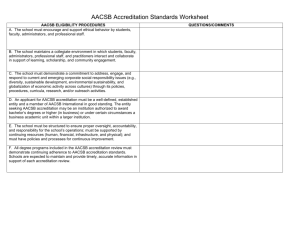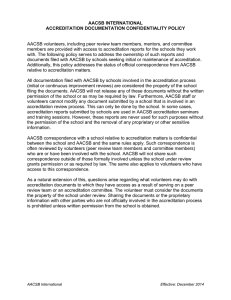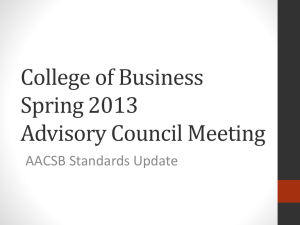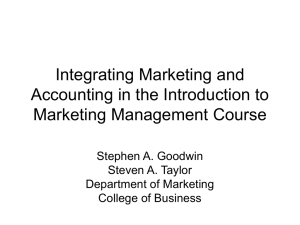AACSB INTERNATIONAL POLICY ON SUBSTANTIVE CHANGE EVENTS RELATIVE TO AACSB ACCREDITATION
advertisement
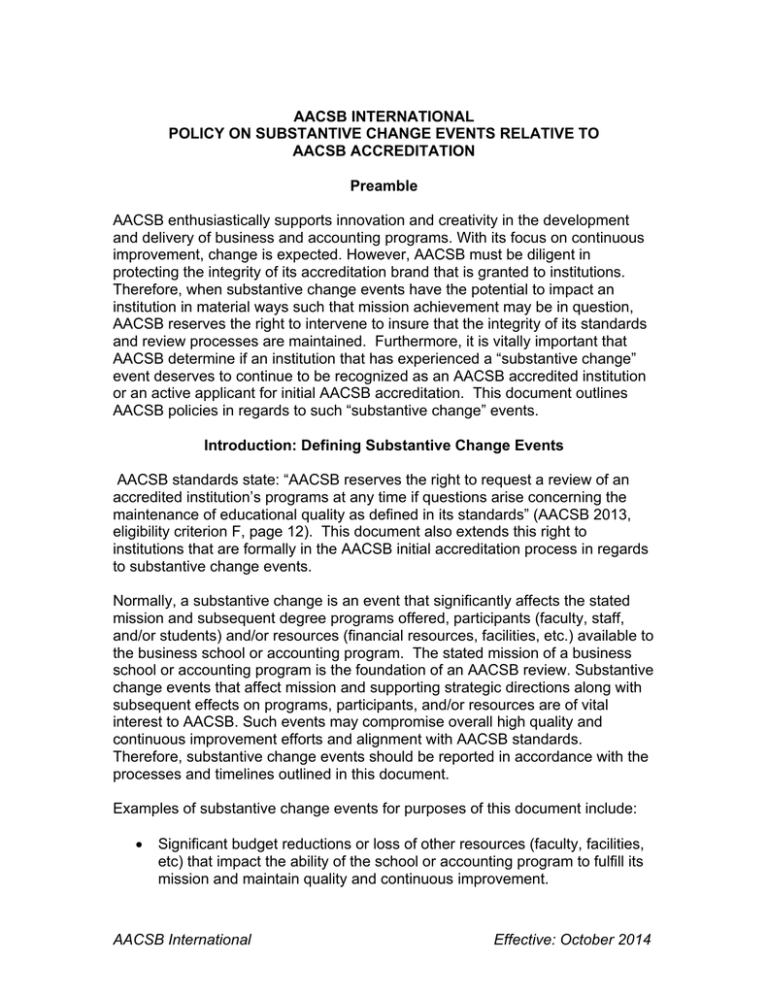
AACSB INTERNATIONAL POLICY ON SUBSTANTIVE CHANGE EVENTS RELATIVE TO AACSB ACCREDITATION Preamble AACSB enthusiastically supports innovation and creativity in the development and delivery of business and accounting programs. With its focus on continuous improvement, change is expected. However, AACSB must be diligent in protecting the integrity of its accreditation brand that is granted to institutions. Therefore, when substantive change events have the potential to impact an institution in material ways such that mission achievement may be in question, AACSB reserves the right to intervene to insure that the integrity of its standards and review processes are maintained. Furthermore, it is vitally important that AACSB determine if an institution that has experienced a “substantive change” event deserves to continue to be recognized as an AACSB accredited institution or an active applicant for initial AACSB accreditation. This document outlines AACSB policies in regards to such “substantive change” events. Introduction: Defining Substantive Change Events AACSB standards state: “AACSB reserves the right to request a review of an accredited institution’s programs at any time if questions arise concerning the maintenance of educational quality as defined in its standards” (AACSB 2013, eligibility criterion F, page 12). This document also extends this right to institutions that are formally in the AACSB initial accreditation process in regards to substantive change events. Normally, a substantive change is an event that significantly affects the stated mission and subsequent degree programs offered, participants (faculty, staff, and/or students) and/or resources (financial resources, facilities, etc.) available to the business school or accounting program. The stated mission of a business school or accounting program is the foundation of an AACSB review. Substantive change events that affect mission and supporting strategic directions along with subsequent effects on programs, participants, and/or resources are of vital interest to AACSB. Such events may compromise overall high quality and continuous improvement efforts and alignment with AACSB standards. Therefore, substantive change events should be reported in accordance with the processes and timelines outlined in this document. Examples of substantive change events for purposes of this document include: Significant budget reductions or loss of other resources (faculty, facilities, etc) that impact the ability of the school or accounting program to fulfill its mission and maintain quality and continuous improvement. AACSB International Effective: October 2014 2 Reorganization of the business school or accounting program Merger or acquisition among institutions where one or more of the participants is AACSB accredited or is formally in the process of seeking AACSB accreditation Other significant changes that affect mission, resources, participants, etc. The above list is not intended to be exhaustive. Any “substantive change” event should be discussed as early as possible with the executive vice president/ chief accreditation officer of AACSB International who will consult with the appropriate AACSB accreditation committee and provide guidance to the school. Early notification is encouraged, even for contemplated events, to ensure schools fully understand the potential impact of “substantive change” events on its AACSB accreditation status. If the “substantive change” event is so material that it may lead to a revocation or denial of accreditation, the matter will be referred to a full meeting of the appropriate accreditation committee and the AACSB Board of Directors (if a denial or revocation of accreditation is involved) before a course of action is formulated in accordance with this document. Changes that result from normal continuous improvement processes and strategic management decisions (e.g., initiation of new degree programs, revisions in curricula of existing programs, internal reorganization of the business school/accounting program not having a major effect on mission, programs, or resources, etc.) are not normally substantive change events. These actions are addressed through the normal initial accreditation or continuous improvement review processes. For such events, there are no unique reporting requirements beyond the processes which are outlined in the Initial Accreditation Handbook or the Continuous Improvement Review Handbook. Any questions regarding what is or what is not a substantive change should be addressed to the AACSB executive vice president and chief accreditation officer. Guiding Principles The following Guiding Principles apply: AACSB International accreditation cannot be “acquired” as part of a subsequent event that involves a merger or acquisition and can only be conveyed to a surviving institution resulting from such events following appropriate self-assessment and AACSB peer review processes and ratification by the AACSB Board of Directors. AACSB assumes that an institution that has experienced a “substantive change” event described in this document wants to earn or maintain AACSB accreditation. If the institution does not wish to earn or maintain AACSB accreditation as a result of a substantive change event, the senior administration (e.g. president, chief academic officer, and dean) of the institution must notify AACSB International in writing as soon as possible Policy developed: January 2008/Revised October 2014 3 Substantive Change Process for Institutions in the Initial Accreditation Stage If an institution is formally approved to be in the initial accreditation stage of AACSB accreditation and is involved in a substantive change event, the institution must notify the appropriate committee (Initial Accreditation Committee IAC@aacsb.edu or the Accounting Accreditation Committee AAC@aacsb.edu) no later than 90 days following consummation of the event. Earlier notification is encouraged. Notification should address the impact of the subsequent event on the institution’s mission, resources, programs, participants and alignment with AACSB standards including changes in the accreditation plan if it has already been submitted and approved. The respective committee will determine the next course of action which may include: 1. 2. 3. 4. Continue with the current accreditation process with additional reporting on the substantive change. Discontinue the accreditation process and request the school reapply for accreditation due to the significant level of change that has occurred as a result of the substantive change. Removal from the accreditation process with denial of the opportunity to reapply for accreditation for a specified period of time in accordance with AACSB policies. Suspension of the accreditation process for no longer than 12 months allowing the school time to address the substantive change before resuming the accreditation process pending IAC approval. If AACSB is not notified under the provisions of this policy, AACSB reserves the right to remove a school from the accreditation process and deny access to reenter the process for no less than 5 years. Substantive Change Process for Institutions that Hold AACSB Business/Accounting Accreditation An institution that holds AACSB business/accounting accreditation and is involved in a substantive change event must notify in writing the Continuous Improvement Review Committee and/or the Accounting Accreditation Committee (CIRC@aacsb.edu and/or AAC@aacsb.edu) of the nature of the change. This written notification should be submitted no later than 90 days following the consummation of the event. Earlier notification is encouraged. The written notification should provide the following information: Policy developed: January 2008/Revised October 2014 4 A brief description of the substantive change event and an assessment of the continuing commitment of the institution to the business and/or accounting programs affected by the substantive change. The expected impact on the AACSB accredited business school and/or accounting program including changes in mission, students served, faculty resources, the portfolio of degree programs offered, and financial resources. The impact of the substantive change event on faculty management policies and procedures related to faculty planning, recruitment, development, and evaluation. The impact of the substantive change on the assurance of learning processes in the business school or accounting program. The revised organizational and administrative structure that emerges from the substantive change. The CIRC and/or AAC will review the report, and one of the following may occur; The business school or accounting program will be notified of any significant issues or concerns which must be addressed as part of the next scheduled Continuous Improvement Review. The next accreditation review may be accelerated. In such a case, the committee will notify the institution of the reporting requirements and revised visit schedule. The committee reserves the right to request a full self-evaluation report from the institution prepared on a standard-bystandard basis or on selected standards to determine the impact of the substantive change event on the business school and/or accounting program and its ability to align with AACSB standards. Failure to notify AACSB in accordance with the spirit and intent of this policy may result in immediate acceleration of an AACSB visit and review. Public Statements Regarding AACSB Status Business schools or accounting programs experiencing a substantive change event will be notified as part of the AACSB review process of the exact language that may be used in public documents, press releases, websites, etc. in regard to their AACSB status following the substantive change event. Appeals Institutions involved in the substantive change events outlined in this document may use appropriate AACSB appeal procedures when it disagrees with the decision of an accreditation committee and, if appropriate, the AACSB board of directors. Appeal procedures are outlined in the accreditation handbooks. Policy developed: January 2008/Revised October 2014 5 Approved by the AACSB International Accreditation Coordinating Committee on 6 January 2008. Policy developed: January 2008/Revised October 2014
